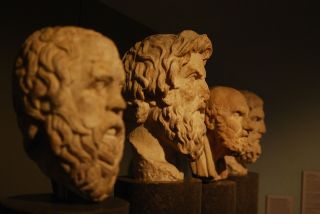Happiness
Aristotle on Happiness
Happiness is not a state but an activity.
Updated June 23, 2024 Reviewed by Kaja Perina

In his Nicomachean Ethics, the philosopher Aristotle tries to discover what is ‘the supreme good for man’, that is, what is the best way to lead our life and give it meaning. For Aristotle, a thing is best understood by looking at its end, purpose, or goal. For example, the purpose of a knife is to cut, and it is by seeing this that one best understands what a knife is; the goal of medicine is good health, and it is by seeing this that one best understands what medicine is.
Now, if one does this for some time, it soon becomes apparent that some goals are subordinate to other goals, which are themselves subordinate to yet other goals. For example, a medical student’s goal may be to qualify as a doctor, but this goal is subordinate to his goal to heal the sick, which is itself subordinate to his goal to make a living by doing something useful. This could go on and on, but unless the medical student has a goal that is an end-in-itself, nothing that he does is actually worth doing. What, asks Aristotle, is this goal that is an end-in-itself? This ‘supreme good’, says Aristotle, is happiness.
And of this nature happiness is mostly thought to be, for this we choose always for its own sake, and never with a view to anything further: whereas honour, pleasure, intellect, in fact every excellence we choose for their own sakes, it is true, but we choose them also with a view to happiness, conceiving that through their instrumentality we shall be happy: but no man chooses happiness with a view to them, nor in fact with a view to any other thing whatsoever.
But what is happiness? For Aristotle, it is by understanding the distinctive function of a thing that one can understand its essence. Thus, one cannot understand what it is to be a gardener unless one can understand that the distinctive function of a gardener is ‘to tend to a garden with a certain degree of skill’. Whereas human beings need nourishment like plants and have sentience like animals, their distinctive function, says Aristotle, is their unique capacity to reason. Thus, our supreme good, or happiness, is to lead a life that enables us to use and develop our reason, and that is in accordance with reason. Unlike amusement or pleasure, which can also be enjoyed by animals, happiness is not a state but an activity. And like virtue or goodness, it is profound and enduring.
Aristotle acknowledges that our good or bad fortune can play a part in determining our happiness; for example, he acknowledges that happiness can be affected by such factors as our material circumstances, our place in society, and even our looks. Yet he maintains that by living our life to the full according to our essential nature as rational beings, we are bound to become happy regardless. For this reason, happiness is more a question of behaviour and of habit—of virtue—than of luck; a person who cultivates such behaviours and habits is able to bear his misfortunes with balance and perspective, and thus can never be said to be truly unhappy.
Neel Burton is author of The Gang of Three: Socrates, Plato, Aristotle.


